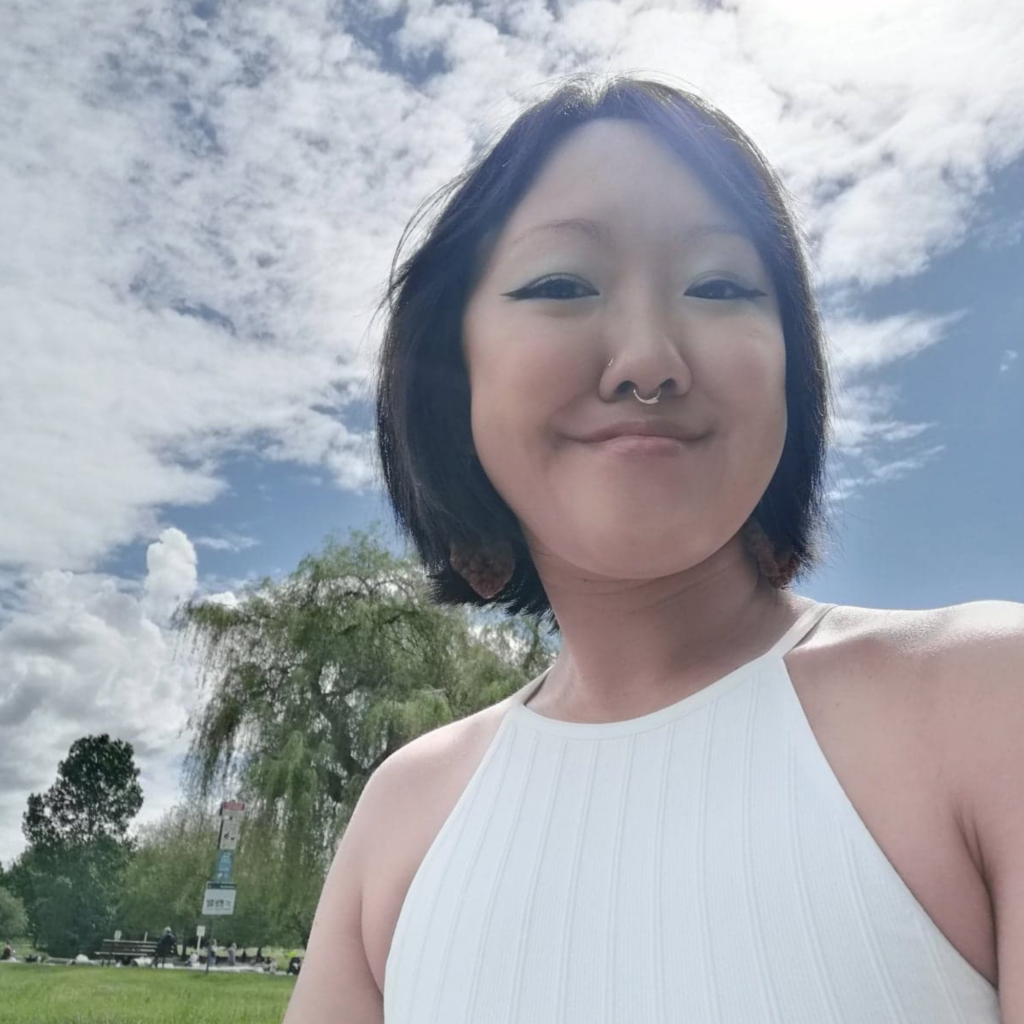Yi Chien Jade Ho’s project, Sense of Place of the Chinatown Grassroots: Aligning Anti-Racism Efforts with Decolonization, has earned her an honourable mention for the 2023 Research Impact Canada Engaged Scholarship Award.
About project
The research project, Sense of Place of the Chinatown Grassroots: Aligning Anti-racism Efforts with Decolonization, is part of my larger doctoral research. Applying place-based narrative and community-participatory methodology, this project documents and investigates the ways in which working-class Chinese immigrant tenants collectively organize to resist anti-Asian racism and rampant gentrification, while learning to align ourselves with Indigenous struggles in Vancouver’s Chinatown. This work focuses mainly on my first two years of experience organizing with senior residents and allies during the 105 Keefer Campaign, a campaign that fought against the development of a luxury condo at 105 Keefer St. in Chinatown and won. During this process, an intergenerational coalition, consisting of second-generation and newer immigrant youths and low-income Chinese seniors, was formed. The coalition worked together to grow its membership and held a series of meetings, gatherings, and workshops to advance the goals of the campaign and to discuss concrete ways to implement decolonization practices into our organizing and actions. This process was enabled first by our own empowerment in realigning our own cultural knowledge and place-based practice to the purpose of social justice work. We then needed to reposition our relationship to the colonial state and with our Indigenous neighbours. In the context of resisting against anti-Asian racism, without aligning with decolonization, these efforts can many times become dependent on the colonial legal immigration system that contributes to further dispossession of Indigenous people. Therefore, decolonization cannot be a mere metaphor nor representational in building an anti-racist community.
To this end, we developed a series of workshops and activities designed specifically for Chinese seniors, as many learning opportunities like public talks and reading groups are often inaccessible to seniors. The youth organizers gathered materials and set up workshops with the elders to discuss topics like the housing crisis, discrimination, community organizing, and colonialism. We also held events such as walking tours led by Chinese seniors for community members to learn about Chinatown through the seniors’ perspectives and how gentrification has impacted the working-class residents.
All our gatherings are conducted in Mandarin and Cantonese, the predominant language spoken by the participants. At the beginning of our meetings, we read territorial acknowledgements out loud in unison. The land acknowledgement is translated to Mandarin and Cantonese. In this context, “acknowledgement” becomes “we express our gratitude” for being on Coast Salish lands belonging to the Musquam, Squamish and Tsleil-Wauth nations, and “unceded territories” becomes literally “lands that have been taken without agreement.” We started this practice not just because it is a necessary protocol, but also because it grounds our meetings and all our collective decisions while creating room for discussion. Additionally, we realized that it can be difficult for many Chinatown elders to fully participate in Indigenous and other social movements and cultivate any personal relationships with the people they might see in their daily lives in Chinatown due to language barriers and racial trauma. We started organizing social gatherings in which people could come together to share traditional foods and stories through interpretation, building personal relationships in a safe space. We also organized the seniors to attend many important indigenous-led actions such as the Annual Women’s Memorial March that brings attention to missing and murdered Indigenous women and gender-diverse people in the Downtown Eastside, so they know that they can be a part of a community of change outside of our own organizing. These actions are always followed by reflection sessions and focus groups, so we can direct the lessons and energy into concrete ideas for our own work.
The research arising from this experience makes three main contributions. First, the project centers the voice and agency of the elderly working-class Chinatown residents. Although Asian immigrants and Asian diaspora are disbursed along the spectrum of class hierarchy, issues facing low-income immigrants, migrant workers, seniors, and refugees are rarely discussed in the mainstream, and when they are, they are treated paternalistically. Second, while there has been ground-breaking and important work done on the interrogation of settler colonialism and decolonization, much of the work has concentrated on critiquing the White settler position. This work joins the conversation many scholars have started in providing both a nuanced understanding of Asian racialization and settlerhood, and concreate examples of on-the-ground practices Asian settlers can take to support reconciliation and decolonization efforts. Lastly, this project fosters cross-racial collaboration and solidarity. Already, Indigenous and Chinese tenants in Chinatown and the Downtown Eastside are working together to push back on unfair housing policies and practices in this area of the City.
About recipient of honourable mention

Yi Chien Jade Ho 何宜謙 (she/they) is an immigrant settler who works as a teacher, researcher, and PhD candidate in the Faculty of Education at Simon Fraser University on the Unceded Territories of the xʷməθkʷəy̓əm (Musqueam), Səl̓ílwətaʔ/Selilwitulh (Tsleil-Waututh), and Skwxwú7mesh Úxwumixw (Squamish) peoples. In her time as a grad student at SFU, Jade has been a community-based researcher at the Environmental School Project, which is a public outdoor elementary school where learning happens entirely outdoors. Jade also teaches various courses including social and educational issues, curriculum theories and implementation, philosophy of education, and community organizing in the Asian and Asian diasporic communities. Outside of academia, she has been a housing-justice organizer in Vancouver’s Chinatown and with the Vancouver Tenants Union. She also worked as a labour organizer at the Teaching Support Staff Union and Contract Worker Justice @SFU. Her doctoral work centers on developing a radical pedagogy of place through the lens of decolonization in cross-cultural contexts and the connection between place, land, and identity in marginalized communities in Taiwan and in Vancouver.